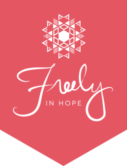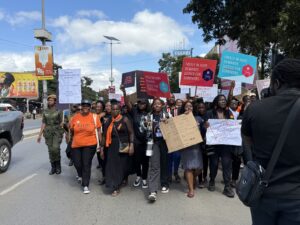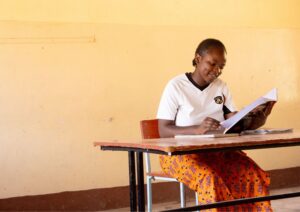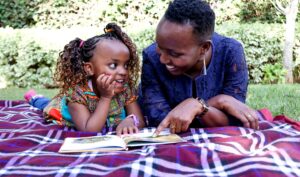Around 2 years ago, I was boarding a matatu (or minibus) at the Kenyatta Hospital bus stop.
As usual, there were several young men calling for pedestrians to board the matatu. I entered the matatu, but as soon as I was seated they turned on their radio, playing music loudly. I began to descend the bus as the music was too loud for me, but the young man that had ushered me into that matatu grabbed me by both my hands and lifted me up.
He began hurling sexual insults directed at different parts of my body, continuing until another young man who was returning home from work intervened. I am forever grateful for his kind act.
While most would agree that unwanted, physical, sexual contact is a violation, we are not quick to identify unwanted, non-physical, sexual contact as a violation. In my experience, the issue of language being a form of sexual violence is raised. This was just one incident of many. Almost every woman that I know has been sexually harassed at some point in their life from catcalling, to unwanted sexual comments from colleagues or supervisors, to text messages with a sexual connotation. One of the most common and most unfortunate language-related violations is parents or relatives referring to a child as a prostitute.
Language is intrinsic in culture and it is the means by which values, beliefs and customs of a culture are communicated. Words have the power to both stigmatize and normalize sexual violence. The use of violent language against women and girls is rooted in toxic power dynamics, and if we are to deal with it we must uproot it from it’s core. I believe that the starting point would be to call it what it is: sexual violence. Any other term sanitizes these actions and minimizes their impact on women and girls.
"Language is intrinsic in culture and it is the means by which values, beliefs and customs of a culture are communicated."
What are some examples of ways that language further violates survivors?
One of the ways that language perpetuates sexual violence is in what is said to or about the survivor. It is very common to hear language that minimizes the harm suffered by the survivor; like when someone says “At least it wasn’t rape” or “It could have been worse, you could have died” or “I thought that happened a while back, shouldn’t you be over it?”. Such comments minimize the harm and trauma experienced by the survivor. No one has the right to tell a survivor how to feel or act, or for how long.
There is also language that blames or shames the survivor, and this is very common in our society. Society blames survivors for their abuse through their dressing, being in the wrong place, drinking, etc. What we may not realize is that this kind of language shifts responsibility from the perpetrator to the survivor, retraumatizes the survivor, and therefore perpetuates sexual violence. The truth is that the perpetrator is 100% responsible for abusing the survivor – it is a choice they made.
What are some things we say to protect the perpetrator, even unknowingly? Why do we say these things?
Language is also used to protect the offender, whether intentionally or unintentionally, by muddling the matter of consent and justifying the perpetrator’s actions. Examples of this would sound like, “But he was your boyfriend/husband”, “Did you actually say no?”, “He was just joking”, or “But he already apologized”. Sometimes it could be threats to the survivor: “If you share this, our family will be broken”. It could be that they do not believe the perpetrator could do such a thing, or maybe they can’t bring themselves to process something so traumatic (self preservation). They may even outrightly want to protect the perpetrator from the consequences of their actions. Such statements exonerate offenders from their actions and deny the survivor justice. Sexual violence does not become violence solely because of the relationship between the perpetrator and survivor, or because of the perpetrator’s motives or character. It is sexual violence because the sexual behaviour was not consensual.
How is sexual violence embedded in our language? How can we use our language to change culture?
If language reflects culture, we may want to ask ourselves what kind of culture our language reflects regarding sexual violence. Our words for sex are violent: pound, bang, or “piga miti in sheng.” And our expressions of anger are sexual: “f*ck off.” Our culture treats violence and sex as near equivalents, yet sexual violence is not sexy and is not even about sex but power. This kind of inoculation slowly normalizes and numbs us to the vice that is sexual violence.
Our language objectifies women and treats them as objects of sexual pleasure. It is not uncommon to hear women being described by their bodies and sexual appeal over their character or personality, even in a political arena. Responses to different kinds of sexual violations may also show this objectification.
In cases of marital rape, a man will say, “I paid for her, so I own her”. In a case of date rape, he will say, “I paid for her dinner so when I ask for sex, I should get it. When she says no, she is just playing hard to get.”
In some traditional practices, girls are “booked at birth” and grow up being referred to as a man’s future wife. This language denies them the opportunity to choose.
"It is not uncommon to hear women being described by their bodies and sexual appeal over their character or personality, even in a political arena."
How can we use language to change culture and not perpetuate sexual violence?
- Do not use violating language. This applies for both men and women. Until you have consent, refrain from making any sexual comments to a woman, man, or child.
- Educate yourself and those around you (especially children). Because violating language has been normalized in our culture, we must always seek to unlearn our old habits in order to learn new habits. We also must teach children how to identify and report sexually violating language.
- Break the silence. If you hear someone using sexually violent language towards another person, call it out and condemn it. Let’s break the culture of silence.
- Do not place blame on the survivor. When a survivor confides in you or if you witness a sexual assault, do not blame or place shame upon the survivor. All you need to do is to assure them of your presence, supporting and allowing them to guide you in the way they would want to talk about the violation.
- Speak out against sexual violence. Become aware of the subtle nuances in our culture that perpetuate sexual violence, and speak up against them.
What will happen if we start to change our language? What will be possible as a result?
When we believe in and prioritize survivors, and demonstrate with the words we say, we help them heal. Instead of causing further harm and violence toward them, we can choose to come alongside them to help them move forward. When we choose courage over fear and helplessness in the way we hold perpetrators accountable, or when we use active language that holds them responsible, we show the perpetrator that we refuse to be part of a culture that enables them to hurt girls and women.
The language we use has the power to shape our culture. Instead of normalizing sexual violence, we can choose to pave another way and co-create a violence free world.
When we choose to be aware of how our beliefs, language, and culture normalizes sexual violence, we can work to change it.
When we confront our own biases, we can change the way we think about sexual violence.
When we change the way we think, we can change our language that normalizes sexual violence.
When we change our language, we can ultimately change our culture that normalizes sexual violence.
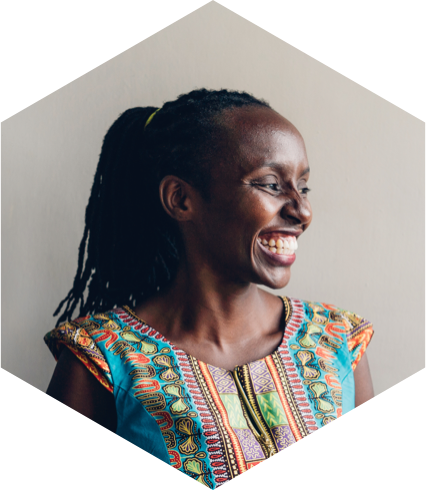
Trizah Waiyaki is passionate about helping organizations and individuals reach their highest potential by establishing systems and structures that facilitate growth and sustainability. She has 8 years of experience working with different organizations and being part of their growth and impact journeys. She finds joy in helping young people discover their God-given potential and begin to live fulfilling and impactful lives. As Freely In Hope’s Operations and Development Director, she dreams of helping build a strong, passionate community of survivor-leaders whose daily pursuit is to use their combined strengths and stories to end the cycle of sexual violence.
Her first degree is a Bachelor of Commerce in Accounting and she is currently pursuing a Masters of Arts in Organizational Leadership at Africa International University. She is grateful for the gift of motherhood and enjoys spending time with her 5-year-old son and 1-year-old daughter. If she wasn’t doing what she’s doing, she reckons, she would have been a musician.
